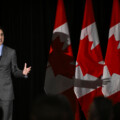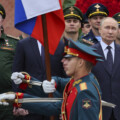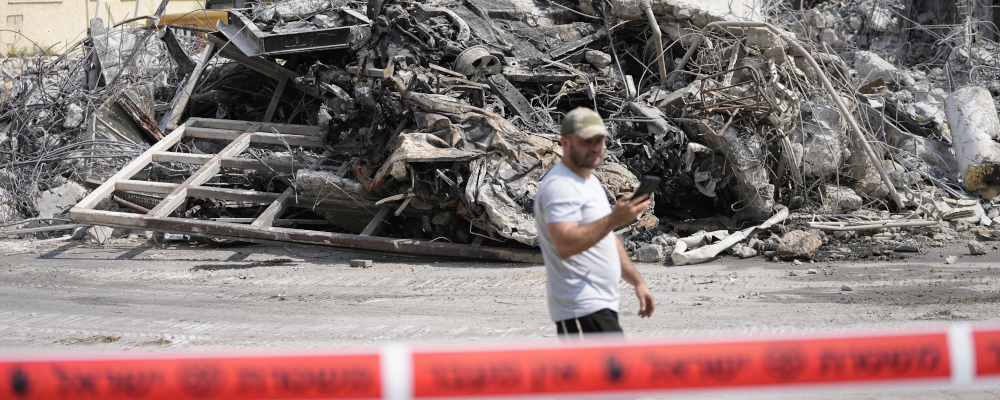Hamas has set a trap for the state of Israel in which they and their fellow Gazans are the bait and the rest of us are the spring-loaded jaws waiting to snap shut on the Jewish state. Hamas is counting on the fact that when Israel inevitably begins its offensive against its terrorist army in Gaza, the governments, pundits, and people of the world will clamp down on Israel, restraining it militarily just when Hamas is most vulnerable. Of course, this trap will only work if we are credulous enough to play along with Hamas’s plan.
So far, the Canadian government has resisted calls from a vocal minority to stop Israel from defending itself, but there are signs that the resolve with which almost all mainstream political parties initially reacted to the Hamas massacre will not last long. Last week, 33 members of Parliament sent Mr. Trudeau a letter “demand[ing] that Canada join the growing international call for an immediate ceasefire.” Most of these were members of the NDP, Green, and Bloc, which was to be expected, but several were prominent Liberals from Prime Minister Justin Trudeau’s own backbench.
No doubt the letter’s signatories mean well—so many of the most dangerous voices in history have meant well—but it is important to be clear about what a ceasefire would mean at this time. First, it would not be just. A ceasefire after one side has committed an atrocity rewards the aggressor’s violence. Second, it would not be neutral. A time-out gives the advantage to the party on the defensive. Finally, a ceasefire would not mean peace, only a pause. It would give Hamas time to retrench and rearm, which means a harder, bloodier confrontation when it does come, with more dead on both sides.
It is also curious that the MP’s letter doesn’t offer a plan. A ceasefire for what? The question is left hanging, as though the point were not to solve the problem but to salve their consciences. If the goal is to buy time to negotiate the release of more hostages, that would at least be a plausible rationale. But the letter doesn’t say that, and it doesn’t offer a timeline to avoid Hamas’s apparent plan to dangle the possibility of hostage releases indefinitely. If it is to broker peace, then it’s a futile and foolish gesture. Hamas has had 18 years to show it can be a viable government for Gaza and partner in peace for Israel. Instead, it used that time to plot the first pogrom of the 21st century. There can be no peace with Hamas.
Israel must remove Hamas. Expecting them not to is unreasonable. Demanding they not, while forensic investigators are still gently prying apart piles of charred bodies to identify victims, is obscene. Even thinking that Canada should have some say in how Israel chooses to protect its people is presumptive. You don’t tell a mother how to protect her remaining children from a murderer who has already killed some of them and has his eye on the rest. About the only condition that the world can reasonably raise is the expectation that Israel defend itself within the laws of war.Even then it’s pretty rich for a Canadian government that doesn’t have to worry about its own borders, and couldn’t defend them in any case, to lecture another country on how to guarantee its existential security.
Which brings us to the word of the day: proportionality. While the mobs in our streets are quite happy to see Israelis—let’s not kid ourselves, Jews—suffer, Israel’s more sophisticated opponents couch their objections in the airy language of international law. Israel’s response, we are repeatedly told, must be “proportional.” But what does this mean? The first thing to recognise is that it doesn’t mean what Twitter jihadis would like us to think it means, which is equivalency in casualties. Proportionally in war is not some kind of macabre double-entry bookkeeping in which bodies are stacked beside bodies until they reach an equal height.
As a moral concept, proportionality informs the goal of Israel’s response, which is to secure lasting peace. It is clear that the decade of relative peace that just ended—a decade that many Israelis are already looking back on as a brief golden age of security, prosperity, and, yes, perhaps complacency—was in fact just a prelude to the resumption of the existential threat Israel has faced since 1948. Nothing has fundamentally changed. October 7th showed that it is not enough to contain the threat posed by Hamas, it must be eliminated. Whatever that takes is proportional, in the broad sense, to the legitimate goal of ensuring Israelis are safe in their homes.
As a legal precept, proportionality in war means that before each military decision—each long-distance missile strike or engagement on the ground—the IDF must weigh the likely military advantage against the likelihood of excessive civilian deaths. Combined with the principle of “distinction,” which says that you can’t deliberately target civilians or civilian infrastructure, “proportionality” is intended to minimise loss of civilian life. Note: minimise, not avoid altogether. In practice, this means no war has ever been fought without civilian deaths. The laws of war do not unduly restrain the military from doing its job of winning the war.
It is also important to remember that human and technical errors mean mistakes will happen, and a mistake is not necessarily a war crime. Even a military that scrupulously follows the laws of war may accidentally kill civilians, and that becomes a near-certainty when the enemy deliberately maximises civilian deaths by embedding military targets in civilian infrastructure. Hamas welcomes the martyrdom of the people of Gaza as a way of delegitimising Israel, which means the majority of civilian deaths in Gaza will be Hamas’s responsibility, not Israel’s. If we forget that Hamas’s entire battle plan is a war crime—from rape to murder to hostage-taking to the use of human shields—we will only encourage more of them.
The ground war that Hamas has been preparing for in Gaza will be slow and brutal. They have forced civilians to remain in the war zone despite warnings from Israel telling them to leave; booby-trapped every block of Gaza’s cities; dug hundreds of miles of underground tunnels that will have to be cleared; and they hold more than 200 hostages they won’t hesitate to use as human shields alongside their own people. On the other side, Israel will incur additional casualties as a result of the caution that comes with attending to the laws of war. Those extra deaths are the tragic price Israel will pay for its humanity, and we should bear them in mind before calling on Israel to show any more “restraint” than is absolutely necessary to win.
We should also prepare ourselves for a high death toll and devastating images. It will be hard to watch at times, even for those who believe Israel’s cause is just and its methods justified. To avoid losing perspective, I recommend watching old war documentaries for comparison. A good place to start is World War II in Colour, especially episodes 7-13. The charred landscapes and flattened city blocks are a reminder of what it takes to win a war decisively, the terrible price paid on both sides, and the hard decisions our own civilian and military commanders took—most defensible, some indefensible, and others somewhere in between—when we faced our own enemy that could not be reasoned with.

This war will be a test of whether any war can be fought, let alone won, in the age of instant information and misinformation. Every decontextualised image will be exploited for its emotional potential, regardless of what it actually shows. We will see the chaotic aftermath of each attack in graphic detail, but will not be privy to the decision-making calculus that preceded it. We will know only what we see on our screens (and perhaps not even that), but we won’t really know what we are seeing. I doubt we could have fought either World War for long under these conditions without demoralising the home front; I am fairly sure couldn’t have won them. So, that is a new challenge that Israel faces.
Finally, we should not forget that this is not our war. Even supporters of Israel’s fight should remember that we are not the ones fighting and resist the temptation to second-guess Israel’s tactics and strategy. It won’t be easy. Social media has conditioned us to feel before we think and to speak before we understand. Hamas is counting on this. Every civilian death is awful, and as feeling humans we should mourn their deaths. But as thinking humans we should remember what war is and has always been. It is hell, as Sherman said, which is why you don’t start one unless you believe the cause is just, and why, once it starts, you have to make sure you finish it on your terms. That is Israel’s responsibility now. All they need from us is not to play the part that Hamas has set for us in its trap.
Recommended for You

Peter Menzies: Justin Trudeau’s legislative legacy is still haunting the Liberals

‘You have to meet bullying with counter-bullying’: David Frum on how Canada can push back against Trump’s trade negotiation tactics

Need to Know: Mark Carney’s digital services tax disaster

‘Putin has no intention of stopping this war’: Sir Bill Browder on three years of war in Ukraine and how Russia is evading sanctions




